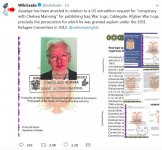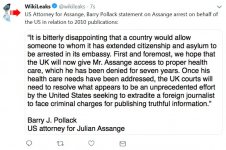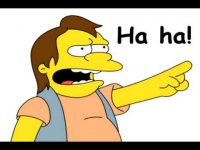- Reaction score
- 25
- Points
- 430
Reproduced under the Fair Dealings provisions of the Copyright Act.
Sync
WikiLeaks among nominees for Nobel Peace Prize
02/02/2011 11:32:59 AM
Wojciech Moskwa
LINK
OSLO (Reuters) - Anti-secrecy website WikiLeaks has been nominated for the 2011 Nobel Peace Prize, the Norwegian politician behind the proposal said on Wednesday, a day after the deadline for nominations expired.
The Norwegian Nobel Committee accepts nominations for what many consider as the world's top accolade until February 1, although the five panel members have until the end of the month to make their own proposals.
Norwegian parliamentarian Snorre Valen said WikiLeaks was "one of the most important contributors to freedom of speech and transparency" in the 21st century.
"By disclosing information about corruption, human rights abuses and war crimes, WikiLeaks is a natural contender for the Nobel Peace Prize," Valen said.
Members of all national parliaments, professors of law or political science and previous winners are among those allowed to make nominations. The committee declined to comment on the WikiLeaks proposal or any other nominations.
Washington is furious at WikiLeaks and its founder Julian Assange for releasing tens of thousands of secret documents and diplomatic cables which it says have harmed U.S. interests abroad, including peace efforts.
Assange, An Australian, faces extradition to Sweden from Britain for questioning in a sex case which he and his supporters say is a smear campaign designed to close down WikiLeaks, a non-profit organization funded by the public and rights groups.
Awarding WikiLeaks the prize would be likely to provoke criticism of the Nobel Committee, which has courted controversy with its two most recent choices, jailed Chinese pro-democracy activist Liu Xiaobo and President Barack Obama a few months after his election.
NOBEL DEFINITION STRETCHED
The prize was endowed by Alfred Nobel, the Swedish inventor of dynamite, who said in his will it was to be awarded to whoever "shall have done the most or the best work for fraternity between nations, for the abolition or reduction of standing armies and for the holding and promotion of peace congresses."
In past decades the committee, appointed by the Norwegian parliament, has stretched Nobel's definition to include human rights, climate activism and even micro-financing, which have been a source of criticism from Nobel traditionalists.
Nobel watchers say a prize for WikiLeaks would highlight the growing role of specialist Internet sites and broad access social media in bringing about world change.
Sites such as Twitter and YouTube have played important roles in mobilizing people in countries with a tight grip on official media, such as Egypt where mass anti-government protests have been taking place.
Kristian Berg Harpviken of the PRIO peace think tank in Oslo agreed that innovative use of "new tools for bringing about peace" could be a major theme in this year's Nobel, but he said he expected the prize to go to a woman after a series of male recipients.
His strongest tip was the Russian human rights group Memorial and its leader, Svetlana Gannushkina.
The nomination deadline may make it difficult for Middle East nominees should mass protests there produce peace.
Egypt's Mohamed ElBaradei won the prize in 2005 as head of the International Atomic Energy Agency, the U.N. nuclear watchdog. Although theoretically possible, no individual has won the peace prize twice. The Red Cross has won three times.
LINK





